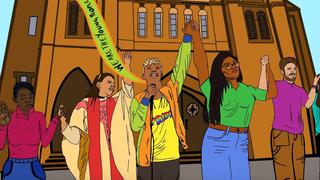On Stage at the Global Synod
Saint Joseph’s University student representatives shared their thoughts on the future of the Catholic Church with Philadelphia Archbishop Perez, Pope Francis and the Vatican.
 Feedback on the future of the Catholic Church was shared in a report illustrated by Becky McIntyre ’17.
Feedback on the future of the Catholic Church was shared in a report illustrated by Becky McIntyre ’17.
At a gathering discussing the future of the Catholic Church with representatives from Philadelphia-area schools, Julia Oseka ’25 suggested that synodality should have the spirit of coffee meet-ups.
“We should meet not only with our peers, but also with our professors and the people who are leading the church — with our parish priests, with our ministers, with our bishops and with our religious sisters,” Oseka says.
Philadelphia Archbishop Nelson Perez, who was in attendance, took her up on the offer. They shared coffee together the following month and discussed the importance of the participation of women and young people in the Church, as well as the presence of underserved communities.
Oseka’s journey to meeting with Perez first started with a small gathering in Wolfington Hall, home of Saint Joseph’s University’s Campus Ministry.
Prompted by a 2021 invitation from Pope Francis for community members of all faiths to share their hopes and dreams for the future of the Church in a three-year global synod, sessions took place across the world. Oseka attended one of the first synodal sessions on campus where she was joined by two other St. Joe’s students.
“It was a tiny session, but it was very fruitful,” says Oseka.
She was also asked to speak at a larger session, which included representatives from Saint Joseph's University and 14 other Catholic universities in the area. The session was shared in a report with Philadelphia’s Archdiocese, the United States Conference of Catholic Bishops, the Association of Catholic Colleges and Universities and Pope Francis himself. The report, Synodality in Philadelphia Catholic Higher Education, identified six major themes: inclusivity, diversity, unity, integrity, accountability and leadership.
The conversations on campus show that young people want to be involved, that people care about their spirituality.
Julia Oseka ’25
“One of the strongest themes I heard from SJU students related to the first theme of "journey from exclusion to inclusion,” says Beth Ford McNamee, EdD, associate director for the Office of Campus Ministry. “Students expressed desire for explicit welcome and hospitality for LGBTQ+ students as well as for students holding other diverse identities. They also discussed the desire for greater opportunities for women's leadership in the Church. That being said, students expressed gratitude for the sense of community that they were experiencing as part of SJU Campus Ministry; we explicitly welcome students of all identities to our programs, communities and spaces.”
The report also included seven pieces of artwork — funded by the Joseph William and Madeline Eberle Klein Fund — by Becky McIntyre ’17, who was commissioned as the “visual note taker” for the event.
“There were 48 listening sessions across 14 campuses —about 400 university students altogether were involved in Philadelphia — and I synthesized all of those notes into images,” says McInyte, a community artist and muralist activist with Walls for Justice.
McIntyre’s experience at SJU, taking an art class with Dennis McNally, S.J., and studying abroad, allowed her to get in touch with the creative nature of art and how art can be transformative and restorative.
“The organizers of the Philadelphia synod session were really intentional in wanting to include the public art creative spirit of Philadelphia into the reports,” says McIntyre.
McIntyre’s art visualized the key themes of the listening sessions, including the importance of welcoming marginalized groups into the Church.
“Students can hear themselves in the words of the report, but they can really see themselves in the artwork that was created and feel represented,” McIntyre says. “I really believe that the arts are so important in the process of dreaming and imagining and visualizing together.”
Oseka’s conversation with Perez led to her being selected as the delegate for the North American continental stage in February. She was the only college student from Philadelphia's Synodality in Catholic Higher Education group to represent the Philadelphia Archdiocese at the event.
The experience was “absolutely breathtaking,” Oseka says. “And I’m extremely grateful and honestly very happy that Archbishop Perez wanted young people to be involved in the continental stage.”
Oseka hopes that her participation on the continental stage will help create a more inclusive church for everyone like the community she has found at SJU.
“What are my hopes?,” Oseka asks, “That our smaller communities will continue to gather — not only gather and talk about the Church but also in different fields. The conversations on campus show that young people want to be involved, that people care about their spirituality.”
